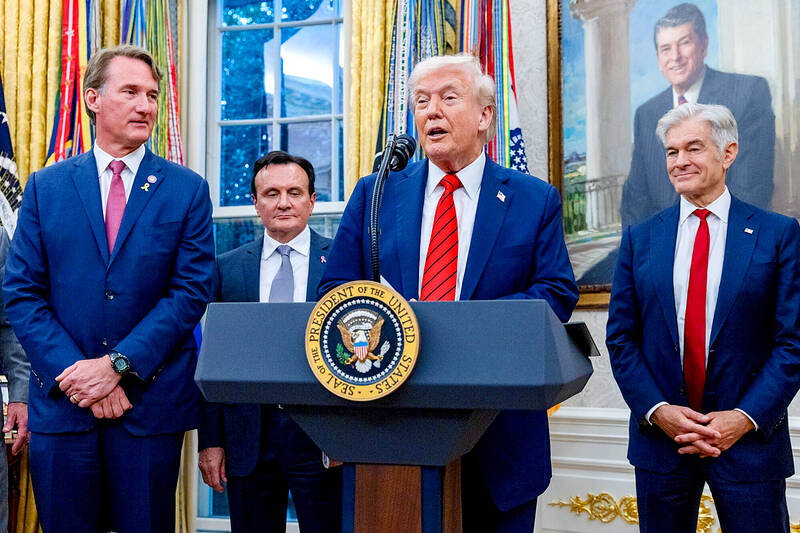US President Donald Trump on Friday announced a deal with AstraZeneca PLC that he said would lead to significantly lower domestic drug prices in exchange for granting the pharmaceutical giant tariff relief.
The agreement, which follows a similar accord announced last month with US giant Pfizer Inc, requires AstraZeneca to charge “most-favored nation” pricing — matching the lowest price offered in other wealthy nations — to Medicaid, the US health insurance program for low-income Americans.
Officials also said the British drugmaker had agreed to participate in a Web site called TrumpRx that would allow direct purchasing at reduced prices.

Photo: Bloomberg
Centers for Medicare and Medicaid Services Administrator Mehmet Oz said the drugmaker would also provide “massively” discounted drugs for lung disease.
In exchange, Trump administration officials agreed to a three-year delay on new tariffs on AstraZeneca, which had previously announced plans to invest US$50 billion in the US in response to looming tariff threats.
“Most of our products are locally manufactured, but we need to transfer the remaining part to this country,” said AstraZeneca chief executive officer Pascal Soriot, who appeared with Trump, Oz and other officials at a White House event early Friday night.
The agreement comes on the heels of a Sept. 30 drug price accord with Pfizer that also included three-year tariff relief. Sky-high drug prices are a perennial source of widespread ire in the US, and have sparked numerous legislative and administrative actions the impact of which can be difficult to determine.
Shares of Pfizer and other drugmakers surged after the Sept. 30 announcement, suggesting they are not viewed as a major drag on profits.
“From a company perspective, you have more visibility going forward,” CFRA Research analyst Sel Hardy said. “They know they’ll not be facing tariffs for three years.”
Hardy said it was too early to discern the breadth of the Trump administration’s impact on drug prices in a broad sense.
Part of that would be determined by pricing negotiations next month on 15 leading drugs under legislation signed by former US president Joe Biden in 2022.

SEMICONDUCTORS: The German laser and plasma generator company will expand its local services as its specialized offerings support Taiwan’s semiconductor industries Trumpf SE + Co KG, a global leader in supplying laser technology and plasma generators used in chip production, is expanding its investments in Taiwan in an effort to deeply integrate into the global semiconductor supply chain in the pursuit of growth. The company, headquartered in Ditzingen, Germany, has invested significantly in a newly inaugurated regional technical center for plasma generators in Taoyuan, its latest expansion in Taiwan after being engaged in various industries for more than 25 years. The center, the first of its kind Trumpf built outside Germany, aims to serve customers from Taiwan, Japan, Southeast Asia and South Korea,

POWERING UP: PSUs for AI servers made up about 50% of Delta’s total server PSU revenue during the first three quarters of last year, the company said Power supply and electronic components maker Delta Electronics Inc (台達電) reported record-high revenue of NT$161.61 billion (US$5.11 billion) for last quarter and said it remains positive about this quarter. Last quarter’s figure was up 7.6 percent from the previous quarter and 41.51 percent higher than a year earlier, and largely in line with Yuanta Securities Investment Consulting Co’s (元大投顧) forecast of NT$160 billion. Delta’s annual revenue last year rose 31.76 percent year-on-year to NT$554.89 billion, also a record high for the company. Its strong performance reflected continued demand for high-performance power solutions and advanced liquid-cooling products used in artificial intelligence (AI) data centers,

Gasoline and diesel prices at domestic fuel stations are to fall NT$0.2 per liter this week, down for a second consecutive week, CPC Corp, Taiwan (台灣中油) and Formosa Petrochemical Corp (台塑石化) announced yesterday. Effective today, gasoline prices at CPC and Formosa stations are to drop to NT$26.4, NT$27.9 and NT$29.9 per liter for 92, 95 and 98-octane unleaded gasoline respectively, the companies said in separate statements. The price of premium diesel is to fall to NT$24.8 per liter at CPC stations and NT$24.6 at Formosa pumps, they said. The price adjustments came even as international crude oil prices rose last week, as traders

SIZE MATTERS: TSMC started phasing out 8-inch wafer production last year, while Samsung is more aggressively retiring 8-inch capacity, TrendForce said Chipmakers are expected to raise prices of 8-inch wafers by up to 20 percent this year on concern over supply constraints as major contract chipmakers Taiwan Semiconductor Manufacturing Co (TSMC, 台積電) and Samsung Electronics Co gradually retire less advanced wafer capacity, TrendForce Corp (集邦科技) said yesterday. It is the first significant across-the-board price hike since a global semiconductor correction in 2023, the Taipei-based market researcher said in a report. Global 8-inch wafer capacity slid 0.3 percent year-on-year last year, although 8-inch wafer prices still hovered at relatively stable levels throughout the year, TrendForce said. The downward trend is expected to continue this year,